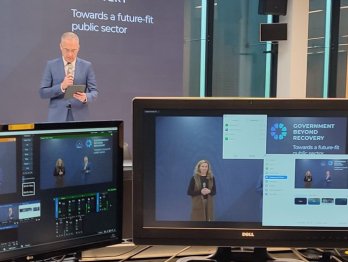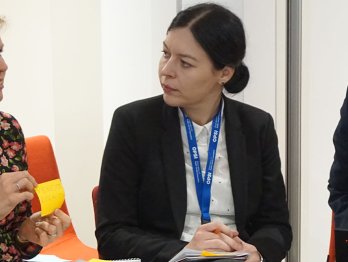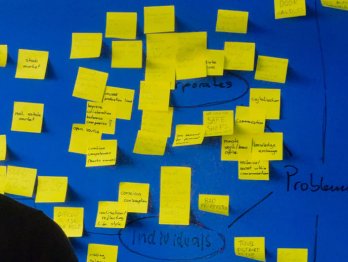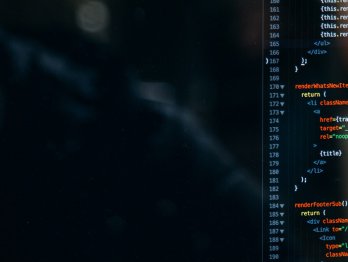In Medias Res teams: The case for crisis learning alongside government covid-19 responses

“In medias res” is a narrative technique, used in a variety of works ranging from The Odyssey to Raging Bull, in which a story opens in the middle of the action. I am co-opting the term here to describe the kind of learning teams we need now to learn alongside covid-19 responses.
The covid-19 crisis has now affected almost every aspect of everyone’s life globally. Nothing in recent history has provided such a unique opportunity and need for innovation. In a chaotic situation with no precedent and often no playbook or best practices, people have few other choices but to act in new ways and in uncharted territory. This war-like consensus around the problem as well as the messy shake-up of the status quo together create opportunities for learning and innovation, both to solve immediate problems at hand as well as learn what we want to keep, what is missing, what we want to revisit under more orderly and stable conditions, and what we want to remember to prepare for the next crisis.
So much learning and innovation are happening on the ground already—the challenge is how to capture and use it, now and in the future, when we are constructing the new path forward. I suggest that now is the time to launch embedded learning teams to capture and reflect alongside the crisis response instead of waiting to do more typical post-mortem reviews or after-action reports. This learning can happen at any level: the OPSI team is following government responses (see here, here, and here) and we are using the framework below for our internal reflections.
The New Legitimacy
Oftentimes in the public sector, a limiting factor for innovation is the amount of legitimacy any one team, agency, politician, or entire governing body has in acting in a new direction. This, coupled with a lack of clarity around the problem(s), is a recipe for inaction. The covid-19 crisis, almost universally deemed Priority #1 for governments, vaporizes these barriers at many levels, assuming that the action is in support of crisis response. This of course has a dark side too, but that is a topic for another blog. Projects and initiatives that were on the back-burner for years have suddenly become scaled-up as the primary option (for example, digital channels for service delivery, telemedicine, etc.). The “business as usual” norms and public values are being stretched to new balances and tensions (for example, efficiency versus privacy in the use of public data). Indirect issues are being created, accelerated, or are becoming more visible or urgent (for example, domestic violence). Without a bit of structure in reflecting upon all this, it is easy to feel overwhelmed.
The cost of doing nothing
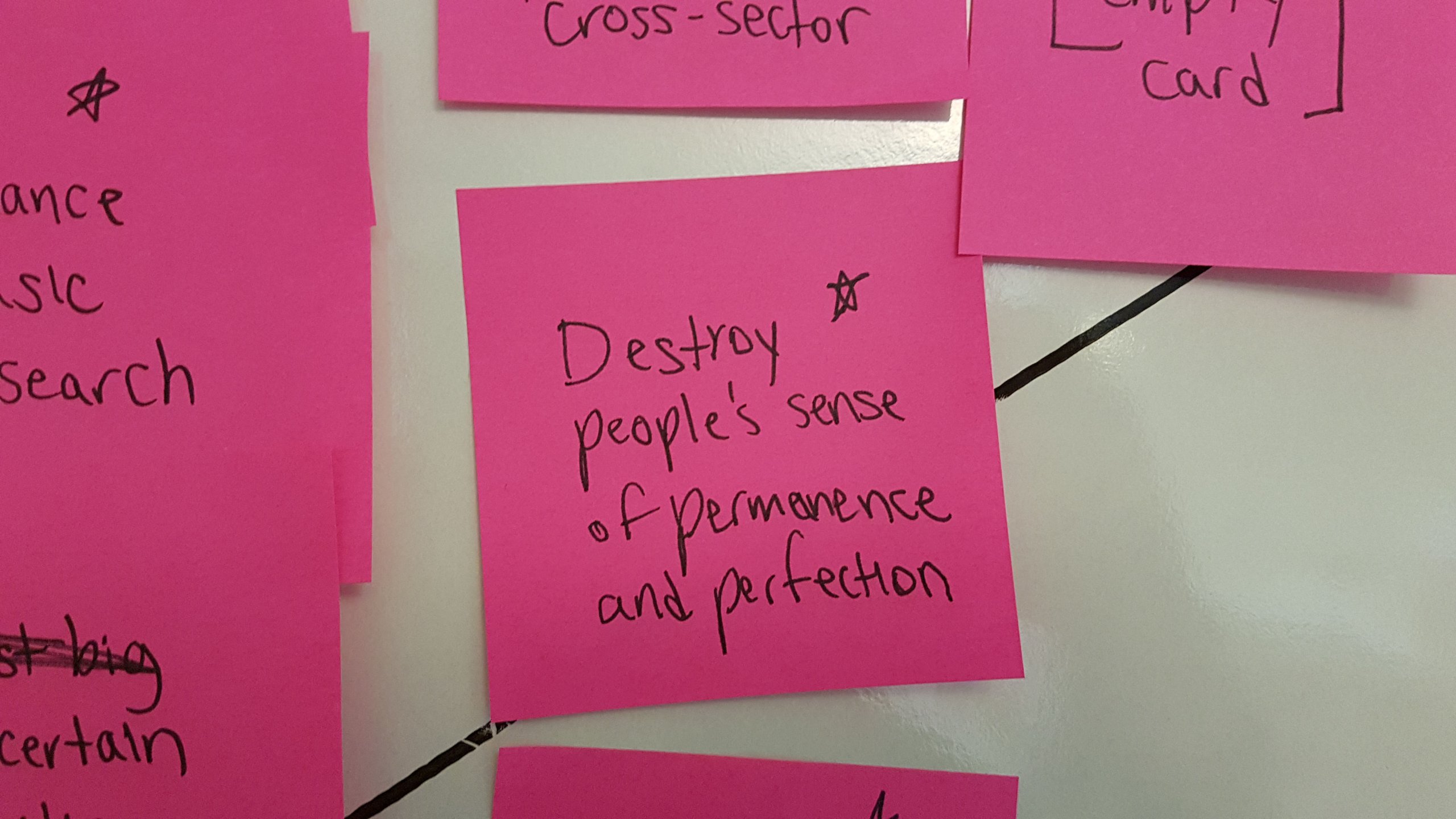
The photo above is a note that is still pinned above my desk in our dark, locked OECD office. Everyone on the team has been teleworking for 4 weeks while in confinement. I created the note during an early draft version of our team’s playbook for moving to more anticipatory innovation in the public sector. The note refers to a process of “unlearning” and I think of it often these days as my notion of learning for innovation has radically shifted.
We are now more likely to accept that a response, even if it is not perfect, is better than nothing. The status quo often prevails, but now the cost of doing nothing is painfully apparent. We are suddenly willing to “unlearn” and accept that our instincts for order, permanence and perfection may not be satisfied. The conditions for innovation are ideal, even if the situation as a whole is unwelcome and disastrously disruptive to people’s lives. Instead of letting the chips fall where they may, we have an unprecedented opportunity to influence the kind of public sector we want in the future. In order to do that, we need ways to learn, and fast.
Learning from practice, “in medias res”
This kind of learning looks different. Instead of learning from stable patterns of evidence over a period of time, a typical approach for policy-makers, we need to create learning loops that capture insights in real time—and, crucially, from practice. Post-mortems, retrospectives, and after-action reports are common methods for crisis response teams and even some regular project teams. While these are good practices, they tend to be reductionist, reliant on somewhat distant memories of fatigued people, and tend to preference the path that was taken instead of the attempts, even if the path taken was not necessarily the best. These methods alone waste opportunities to share immediately actionable information and capture the richness of real-time observations, before memories become foggy.
I sense a tendency for leaders, governments, and international organisations to want to create a sense of order as quickly as possible and to develop “best practices” in response to the crisis. While I am a big fan of these things in general, this might not be the best time to develop them. As the crisis evolves, contexts evolve—and the courses of action need to be sufficiently flexible to adapt. The best practice for now is to invest in systems for continuous learning, “in medias res” (IMR). Dropping into the middle of the action will enable teams to learn quickly from those responding without a playbook.
In the longer term, developmental evaluation may be a great place to look for examples of how to do this over time and reflect upon what was invested.
To Deploy or Not to Deploy
This may not seem like the best time to create or deploy an IMR team; critical resources should be prioritised for immediate life-saving functions and new teams should not create significant distractions for those conducting those functions. Further, it risks putting additional people in danger of exposure to the virus. The decision to deploy an IMR team should absolutely take these factors into consideration. The team need not focus on the covid-19 medical response directly—plenty of other responses and changes are happening indirectly, including most government services. For those choosing to deploy a team, below I pose a set of considerations and questions as a framework for real-time reflection, both about the crisis at hand as well as things filed away to revisit later.
Learning and sense-making in the mess
These are an initial set of questions that IMR teams could start with to frame their learning. The first set of questions is observational, while the second and third set might require some contextual knowledge, particularly when it comes to public values. Keep in mind that these reflections need not be judged positively or negatively at this time and some may very well need some public deliberation before they are considered acceptable beyond the crisis.

What do we see? (Insights from the field; non-evaluative, just observations)
- From the edge – entirely novel things that we are just starting to notice
- Stabilising patterns – things that are starting to spread among several governments/contexts
- Emergent practices – things that are starting to represent more normalised practice, across governments/contexts.

What do we notice? (Evaluative reflection)
- Practices fully replacing existing practices or making them obsolete or incoherent
- Practices to sustain – practices that were positive/recommended in a pre-crisis context and are being taken up more readily now (for instance, hygiene)
- Practices to re-evaluate post-shock – practices that might work now but should be re-evaluated for long term use
- Practices that conflict with pre-existing beliefs/systems but are accepted given changing circumstances (for instance, joint procurement of medical supplies across countries; exchange of material/patients records across medical services).

What might it mean? (Meta-level reflections)
- Things we are watching closely – potential ethical issues, indirect effects, systemic impacts, potential opportunities for exploitation, etc.
- Tensions forming or shifting (for instance, efficiency vs privacy)
- Existing things picked up again/repurposed – things being pushed ahead of other initiatives or “rediscovered” (for instance, idea management, digitalisation of services, etc.) as well as the factors made that possible
- Things that might now possible – the expansion of the “Overton Window,” or formerly extreme possibilities that might now be possible or acceptable outside of crisis conditions (for instance, citizen surveillance, Universal Basic Income).
How to get started with a team
I use the term “team” as a loose concept; it may be just one person serving this role or a combination of people shifting in and out of this role. The reflection questions work at many levels and in all fields. You need not have an innovation office or an existing innovation team or “tiger team,” although these groups may be most familiar with working in fast-paced or ambiguous situations. Consider re-purposing groups that are suddenly light on their regular tasks (for instance, in-person language interpreters, etc.). The existence of the team should be made aware to those being observed so they do not feel uneasy about the team’s presence (both physically and virtually). You need not focus the team on the medical response directly—and this is probably not advisable unless you work on a medical response team. For instance, you might consider forming a team to observe the transformation of services to digital formats, those working on fast-tracked procurement, or those on a policy strategy team forming to respond to the crisis. The key is the action of observing and reflecting on something in your zone of influence.
Some considerations for the IMR teams themselves:
- Safety – Observation and reflection may involve some physical and psychological safety risks, especially for teams in medical settings close to the crisis response. Consider safety risks according to what your own organisational experts advise. If field observation is not possible, consider digital tools as a backup and focus on secondary or tertiary services and structures.
- Direct line to the top – IMR teams may uncover things that have immediate life-saving implications and may need quick attention and a systemic shift in approach—some that only the highest levels of authority may be allowed to change. This line of communication should be available for the teams.
- No retribution for delivering bad news – IMR teams may uncover things that make leaders nervous. Innovation can result in deviation from the rules in order to get things done, sometimes saving lives. (For instance, a civil servant mentioned to me that data privacy rules were being circumvented in the course of planning the delivery of masks to every residence in their city.) Neither the bad news messengers nor the rule-breakers should be punished or treated the same way as they would in non-crisis times, unless they are intentionally causing harm. Instead, add these things to a list of items to watch or revisit later. Our collective values and rules during a crisis (such as efficiency in response) may be different than those afterward, but it is important to revisit these in due time.
- Observation only – The team should be distinct from those providing the response or delivering services. While the two are clearly self-supporting activities, it is cognitively difficult to reflect and deliver services simultaneously, so these should be distinct activities—ideally, different roles. Adding additional tasks onto service providers who are already strained may create resentment or worse.
- Accessible, low-friction collection – responders are busy, so reduce the burden of the reflection. The reflections should not feel like compliance reviews. Set an expectation for the amount of time you are asking for (and stick to it) as well as the frequency. Provide accessible means of collection, flexible to work in any situation. Assume responders have no extra time to log on to an additional system. If possible, do the collection yourself.
- Target services that are disrupted – these will be the most difficult situations to access but will likely provide the most knowledge about how innovation is happening. Get as close as possible without getting in the way.
- Involvement of non-expert experts – Experts may be too biased by their own knowledge to notice patterns or signals they did not expect. They may have difficulty to see the things that do not fit their experience, so involve naive observers or those that do not have a direct stake in the outcome.
Acting on the learning
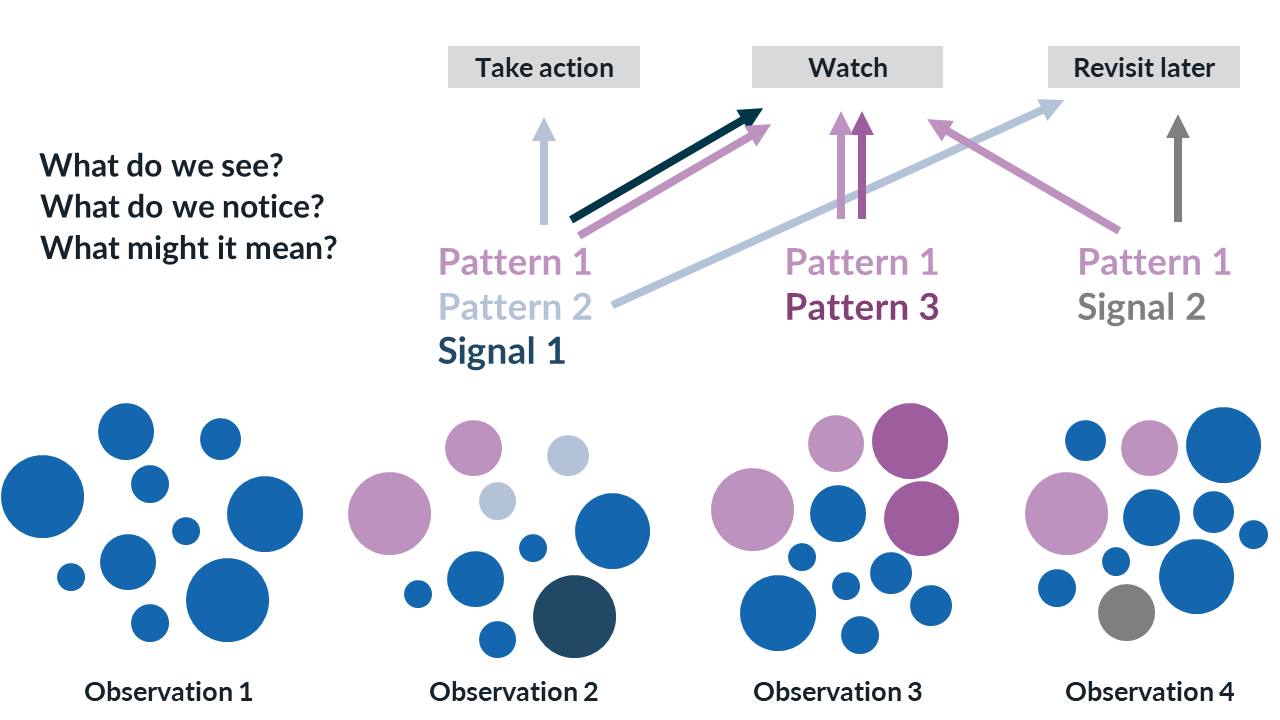
Learning and knowledge creation is good, but learning in medias res requires quick triaging of the observations and reflections. Try not to make this process too cumbersome for the teams or the overall practice may be abandoned. Look for patterns (groups of observations noticed more than once) and signals (observations that are unexpected, of high interest, or possibly related to something else going on). One strategy: identify time horizons for the both, such as:
- Action list for things immediately and obviously relevant today or tomorrow – these should be fast-tracked to those who have some ability to act on the information, including those at the top
- Watch list for things that need to be watched closely and revisited soon to see if there is a pattern – these things should be shared with the rest of the team in the short term. For things changing rapidly – these should be shared with the team and considered for flagging to those managing the response
- Revisit list for things that are concerning or curious but are not actionable in the near term – set a date to revisit these.
Certainly, other strategies exist so consider adapting to existing practices and information channels that make sense for you. Keep in mind, you may need to develop these channels. In any case, make the information concise so it has the best chance of actually being read.
So how does one get started? I am sharing this basic template as a starting point. I strongly recommend that you create a copy and adapt it to your own situation. Please share the adaptations you create. I will post them here for others to use and further adapt.
TEMPLATE to copy and edit to suit your needs
This is an initial set of suggestions developed through discussions with the OPSI team and it completely open to edits and suggestions in its entirety. Please feel free to comment or reach out directly. I welcome your perspectives on these issues and to challenge my thinking on this—it is neither permanent nor perfect. What am I missing?
Photo credit: NEXU Science Communication
See also: All of our work on this topic will feed into the broader work of the OECD in compiling data, information, analysis and recommendations regarding the health, economic, financial and societal challenges posed by the impact of Coronavirus (COVID-19). Please visit the dedicated page for a full suite of coronavirus-related information.


